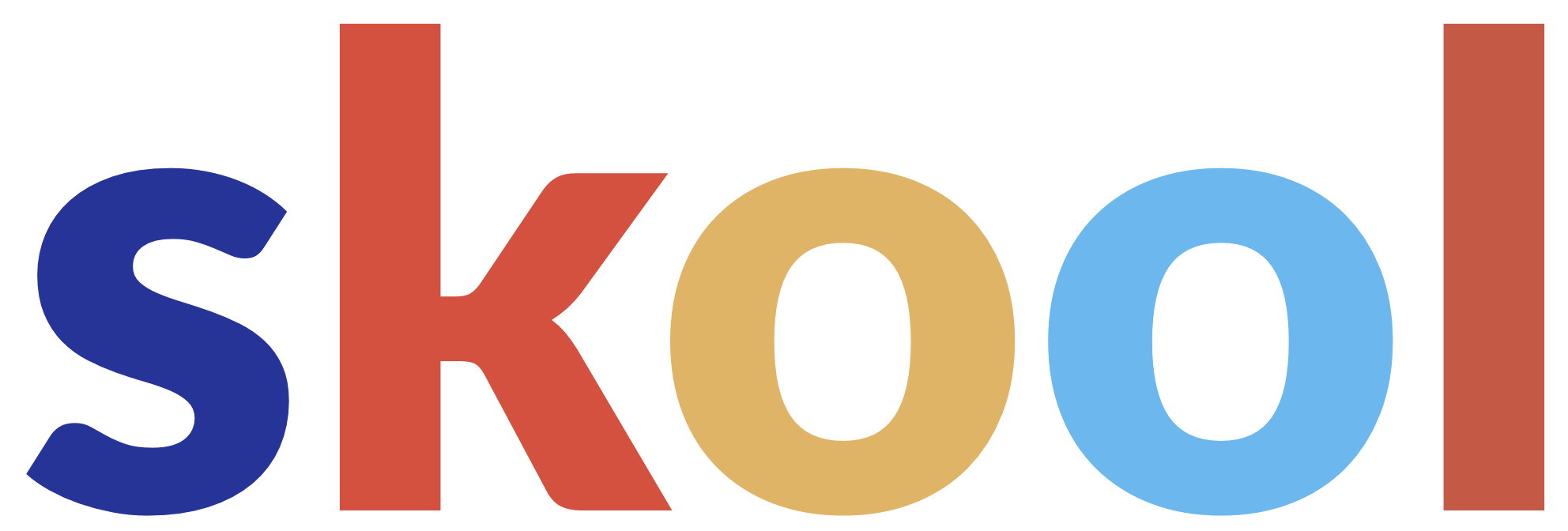Skool provides a place for creators to grow and learn. It is a one stop shop for creators looking to build brands, deliver courses, and engage meaningfully with their audiences.
Skool lets creators create a community of learners who can share knowledge, work together on projects, and ask for help from the creator. Skool offers creators all of the tools necessary to host and deliver effective courses. This includes video lessons and text lessons as well as quizzes and tasks.
Skool has more to offer than just hosting a course and community. Skool is a platform where creators can collaborate with their communities to create something special. This is a place for people to learn and grow. They can make new friends and reach their goals.

Here is a short video overview of Skool by Scott Weberg from his YouTube channel for those who want a more visual experience. However, if you want a more in-depth review, you can also read the whole review below.
What is Skool for and to Whom is It Aimed? Community Platforms Examples
Skool, a platform for hosting courses and a community of online entrepreneurs and mavericks Sam Ovens founded it in 2019. Its aim is to place the community at the heart of the student experience, make it easy for students to interact and increase client results.
Skool offers a unique set of features for community-centered programs, including a leadership board for gamification and reward, a visual calendar to organize online/offline events, and members’ profiles, direct messaging, and chat. Skool has a core set of features that includes the creation of courses (no videos hosted), creating communities with user-generated content, native payment, and mobile apps.
Skool’s user experience is remarkable, mainly because it requires no time to learn how to use it. It is missing some essential features, such as video hosting.).

> > Click Here to Try Skool Now< <
Who is Skool Designed For?
Skool can be used by anyone who is interested in building a community and engaging with it around a common interest or goal. This includes business owners, nonprofit organizations and individuals.
Skool can be used by course creators to teach their courses and create a community for their brand. Skool can be used by businesses to host employee training programs. Skool can be used by nonprofit organizations to create communities and connect with supporters. Skool allows individuals to create communities based on their hobbies and interests. Community Platforms Examples
Skool is a versatile platform that can be used by anyone who wants to build and engage with a community. As such, it is a platform that can help passionate individuals to connect with like-minded people who share common interests and achieve their goals together.
Below are a few examples of how people use Skool.
- Skool is used by a fitness instructor to host online fitness classes. She also builds a supportive community of fitness enthusiasts.
- Skool helps a marketing specialist deliver online courses to her students. She can also connect with them on a deeper, more personal level.
- Skool allows a charity to build a community around their cause and reach out to supporters.
- A group of friends use Skool to create a community where they can share their love of cooking and recipes.

> > Click Here to Try Skool Now< <
Why Use Skool?
Skool can be a powerful tool to build and engage with a community. It has all the tools for community building, gamification and engagement .
Some of the benefits that come with using the platform include:
- Skool has tools that help you build and engage a social community based around your common interests or goals. You can create live chat rooms, discussion forums and direct messaging.
- Host and deliver courses effectively: Skool is a great platform for hosting and delivering courses. You can create video lessons, text lessons, quizzes, and assignments and track your student’s progress. Skool provides analytics tools.
- Gamify learning: Skool features such as gamification can encourage your students and community to engage and learn. You can award points, badges, and levels for completing tasks.
- Get support from a dedicated team: Skool’s team is dedicated to helping you succeed. The team offers resources, such as webinars, tutorials, and individual support.

> > Click Here to Try Skool Now< <
Skool Features Explained in Depth
Community Features
Skool has a set of unique features that are perfect for community-centered programs. These include a leaderboard for gamification, a visual event calendar for online and offline events, member profiles, direct messages, and chat. Skool’s user experience is remarkable, mainly because it requires no time to learn how to use it.
Skool has a community feature that includes
Skool’s discussion forums allow your community to share ideas and ask questions. You can create discussion forums for different topics or courses and moderate them to ensure that conversations stay on track.
Live chat: Skool offers a live chat feature that allows members of your community to communicate with each other and you in real-time. It’s a great tool to help your community members with their questions. Live chat can be used to host live events such as Q&A sessions and workshops.
Direct messaging: Skool’s direct messaging feature allows your community members to send private messages to each other. This feature allows members of your community to establish deeper relationships with one another. Direct messaging can be used to offer personalized support to members of your community.
Skool allows you to create small communities within the larger community. This is an excellent way to organize community members around certain interests or goals. For example, you could create groups for different courses, different levels of experience, or different industries.
Course Hosting Features
Skool, an all-in-one platform, combines community building tools for easier management of online presence. The intuitive interface provides a user-friendly design to create a seamless experience both for community members and creators. Skool provides a fun and engaging gamified environment that encourages progression.
For Course Hosting, Skool’s features include
Skool lets you upload and host video lessons. You can also add text, images, and quizzes to your video lessons.
Text lessons. Skool allows for the creation and publication of text lessons. Text lessons can be enhanced with images, videos, and quizzes.
Quizzes: Skool allows you to create quizzes to assess your students’ understanding of the material.You can create multiple-choice quizzes, true/false quizzes, fill-in-the-blank quizzes, and essay quizzes.
Skool gives you the ability to create tasks for your students. You can upload assignments in the form of text, files or images.
Skool gives you access to course analytics, so you can track how your courses are doing and make any necessary changes. You can see data such as student engagement, completion rates, and quiz scores.
Gamification Features
Skool offers a leadership board for gamification and reward, which encourages progress and incentivizes interaction. Community Platforms Examples
Gamification features are available for a number of devices.
Skool’s Points feature allows you to award your community members points for participating in discussions and completing courses.
Skool lets you create badges and give them to members of your community for reaching specific goals. For example, completing a set number of courses or accumulating a specified number of points.
Skool lets you create levels and assign them to community members according to their points totals. This is a fantastic way to keep your community active and involved.
Other Features
Aside from the features mentioned above, Skool also has the following features:
Paid memberships: Skool allows you to create and sell paid memberships to your community. This is a great way to generate revenue from your community.
Integrations with other platforms: Skool integrates with a variety of other platforms, such as Zapier, Stripe, and Mailchimp. You can automate and streamline your workflow.
Skool allows for custom branding. You can customize your community branding to match the brand identity. Add your logo, colors, and fonts to the website and mobile application of your community.
Skool’s member management tools allow you to easily manage the members of your community. These tools include the ability to add and remove members, approve member requests, and assign roles and permissions.

> > Click Here to Try Skool Now< <
Skool Pricing Plans
Unlike most SaaS, Skool has only one pricing plan. Skool is available for 99$ a month. The features include:
- Unlimited users
- All Courses Available
- Unlimited storage
- All Community Features Community Platforms Examples
- All-course hosting features
- All gamification features
- All Other Features
Skool also provides a 14-day free trial for users to try the platform before committing to it.

> > Click Here to Try Skool Now< <
Pros and Cons
Pros
- Skool has a set of unique features that are designed for community-centered programming. These include a leaderboard for gamification, a visual event calendar for online and offline events, as well as member profiles, direct messages, and chat.
- Skool’s user experience is remarkable, mainly because it requires no time to learn how to use it.
- Skool has an intuitive, user-friendly interface for both creators and members of the community.
- Skool is a gamified, fun experience that engages and motivates users.
- Skool’s price plan includes all features and has no hidden charges.
- Skool gives users a 14 day free trial so they can test out the platform before signing up for a subscription.
Cons
- Skool is currently lacking certain features (video hosting etc.).).
- Skool’s subscription price could be expensive, considering what other tools are needed for course creators.
- Skool’s online course building tool isn’t the best.

> > Click Here to Try Skool Now< <
What Should You Know About Skool Before Using It?
Who Should Use Skool?
Skool offers a platform that includes a number of tools to help manage your online presence. It has an intuitive design that is user-friendly for both creators and members of the community. Skool offers a fun, motivating and gamified user experience to encourage progress. Skool offers an easy-to-use platform for hosting your courses, and building your community.
Who Should not Use Skool
Skool might not be your best option if you’re looking for an advanced online course builder, with features like video hosting or checkout. Skool subscription prices may also be prohibitive if you need a cost-effective option or only have limited funds to spend on your online management. Community Platforms Examples
Overall Recommendation
Skool has a diverse range of users. This includes course creators, influencers, entrepreneurs and coaches. Its robust features enable users to do many things, including host online courses, manage subscription memberships, create group funnels, and organize coaching programs, among others. Skool targets mainly creators, teachers, and companies who are looking to centralize and grow their online presence.
Skool has a set of unique features that are perfect for community-based programs. These include a leaderboard for gamification, a visual event calendar for online and offline events, member profiles, direct messages, and chat. Skool is a great tool, and it’s easy to use. Skool’s gamified experience is fun and motivates users to make progress.
Skool currently lacks some features that are essential (video hosting). Skool subscription prices could be high, given the other tools needed by course creators.
Skool is not an excellent course builder but it does an excellent job at its core focus: creating a community that shares a common goal.

> > Click Here to Try Skool Now< <
Conclusion
Skool has been discussed in the review as a powerful, affordable platform to create and engage a community, host and deliver courses, and gamify learning. This is an excellent platform for those who want to create courses, run a business, or learn together as a group.
Skool is a great tool for learning. I suggest you take advantage of the 14-day free trial. You can also read reviews from other users to get their feedback on the platform.
Skool, as a whole, is an excellent option for anyone wanting to build a vibrant community while delivering high-quality courses.

> > Click Here to Try Skool Now< <
Skool Frequently Asked Questions Community Platforms Examples
Who is Skool Designed for?
Anyone who wants to engage and build a group around a shared goal or interest can use Skool. This includes individuals, businesses, non-profit organizations, and course creators.
How do I get Started with Skool?
You can register for Skool on the Skool site.
After creating an account, start building your community. You can add members, create discussion forums, and upload content.
Can I Sell my Courses Using Skool?
Skool can be used to sell courses. Skool includes a wide range of features that can be used to help sell your course, including paid memberships. Course analytics, gamification, and more.
Does Skool Charge Fees per Transaction?
Skool charges 2.9% plus 30c/transaction.
When does Skool Payout?
Skool sends your available balance directly to your bank every Wednesday.
What Currency does Skool Utilize?
Skool prices are all in USD. Your local currency is used for payouts.
What is Skool’s Refund Policy?
Skool has a policy that allows Creators the discretion to refund members.
Skool can issue refunds at their discretion depending on the circumstances. Skool is unlikely to refund Creators in most cases.
